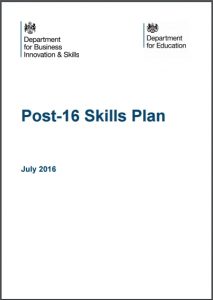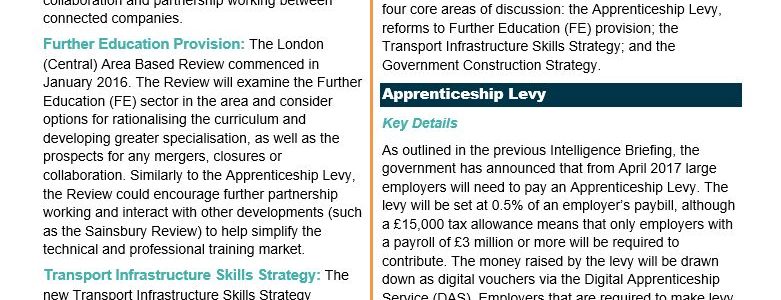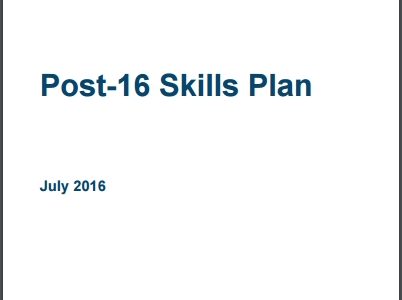Skills minister Nick Boles has said the UK government accepts and will implement every one of Lord Sainsbury’s 34 recommendations on technical education reform ‘unequivocally where possible within current budget constraints’ (reports Infrastructure Intelligence today).
The government’s Post-16 Skills Plan has been published simultaneously with, and as a response to, the Sainsbury independent panel report on technical and professional education, having been delayed due to the EU referendum (both are available online here). Sainsbury says the UK’s current system of technical education is overly complex and fails to deliver the skills most needed – as a result, the UK lags behind countries including the US, Germany and France in productivity per person.
Sainsbury’s recommendations include setting up distinct and coherent technical education routes for young people, with two modes of learning: employment-based, typically via an apprenticeship; and a college-based option. Government will build this new technical education route, simplifying the system by establishing a common framework of 15 technical education routes – including one for construction – encompassing all occupation types. Currently there are over 13,000 different qualifications available for 16-18 year-olds. Sainsbury also calls for a common initial core of maths and English for all technical qualifications before specialisation.
The report has been welcomed by EngineeringUK chief executive Paul Jackson, who said:
“It’s vital for the future health of the UK economy that young people in sufficient numbers develop the engineering skills that employers need. And it’s equally vital that the routes to developing these skills are student-centred, offering every young person the best possible opportunity to thrive in their chosen industry. …
“Putting employers front and centre of the development of the routes and providing more structured work placements as part of a technical education programme will have a positive impact on the work-readiness of those entering employment, with new recruits and employer both reaping the benefits. Government’s Post 16 Skills Plan is reassuring and has now to be backed with the practical and financial support their implementation will require.”
The Post-16 Skills Plan – some details
The Post-16 Skills Plan shows that construction – currently employing over 1.6 million people – is among the most critical routes to employment, second only to ‘business and administrative’ (2.2m), and currently ahead of ‘engineering and manufacturing’ (1.3m). The Plan will create high-quality, two-year, college-based programmes at the start of each route, suitable for 16–18 year-olds, but which can also be accessed by adults (students aged 19 and over).
New specialist training providers will also be introduced. The provision of university technical colleges (UTCs) will be expanded, and, where industries of national economic or strategic importance are facing particular challenges in recruitment, new National Colleges will be created. These will lead the design and delivery of technical skills training in five key sectors: nuclear, digital skills, high-speed rail, onshore oil and gas, and the creative and cultural industries.
Farmer Review
 Importantly, the Skills Plan also commits (sections 7.4 and 7.5) to “taking action in response to the review we have commissioned from the Construction Leadership Council and Mark Farmer (the Farmer Review) of the functioning of the labour market, including skills provision, in the construction sector.” The government will also review the Construction Industry Training Board (CITB) and the Engineering Construction Industry Training Board (ECITB), seeking to boost domestic construction skills and drive up productivity in the construction sector. We are pleased to read this – Mark Farmer has taken a keen interest in EthosVO’s SkillsPlanner and in related initiatives such as BuildForce, launched at the Houses of Parliament on 29 June.
Importantly, the Skills Plan also commits (sections 7.4 and 7.5) to “taking action in response to the review we have commissioned from the Construction Leadership Council and Mark Farmer (the Farmer Review) of the functioning of the labour market, including skills provision, in the construction sector.” The government will also review the Construction Industry Training Board (CITB) and the Engineering Construction Industry Training Board (ECITB), seeking to boost domestic construction skills and drive up productivity in the construction sector. We are pleased to read this – Mark Farmer has taken a keen interest in EthosVO’s SkillsPlanner and in related initiatives such as BuildForce, launched at the Houses of Parliament on 29 June.
More open data (hurray!)
And, of particular interest to SkillsPlanner and its development of an online skills platform driven by Open Linked Data (if you’re not sure what this is, watch Sir Nigel Shadbolt’s explanation) there is also a commitment to releasing more data. Chapter 6 of the Skills Plan makes “Information and data” the first of its key enabling factors. It aims to guide people through the system and make informed choices about what to study by:
“… making more information available about what students go on to do and how much they earn after taking particular routes or apprenticeships, and how the performance of colleges and other training providers influences students’ performance in working life. This information needs to be easy to access and understand so that people can use it to compare different education and career options and make confident and informed choices.
“… For the first time, we are using information held by the Department for Education; the Department for Business, Innovation and Skills; the Department for Work and Pensions; and HM Revenue and Customs to get a better understanding of how young people move through education and into work, and from autumn 2016 we will be making more of this information publicly available….”
 Further Education Provision: The London (Central) Area Based Review commenced in January 2016. The Review will examine the Further Education (FE) sector in the area and consider options for rationalising the curriculum and developing greater specialisation, as well as the prospects for any mergers, closures or collaboration. Similarly to the Apprenticeship Levy, the Review could encourage further partnership working and interact with other developments (such as the Sainsbury Review – post) to help simplify the technical and professional training market.
Further Education Provision: The London (Central) Area Based Review commenced in January 2016. The Review will examine the Further Education (FE) sector in the area and consider options for rationalising the curriculum and developing greater specialisation, as well as the prospects for any mergers, closures or collaboration. Similarly to the Apprenticeship Levy, the Review could encourage further partnership working and interact with other developments (such as the Sainsbury Review – post) to help simplify the technical and professional training market.





